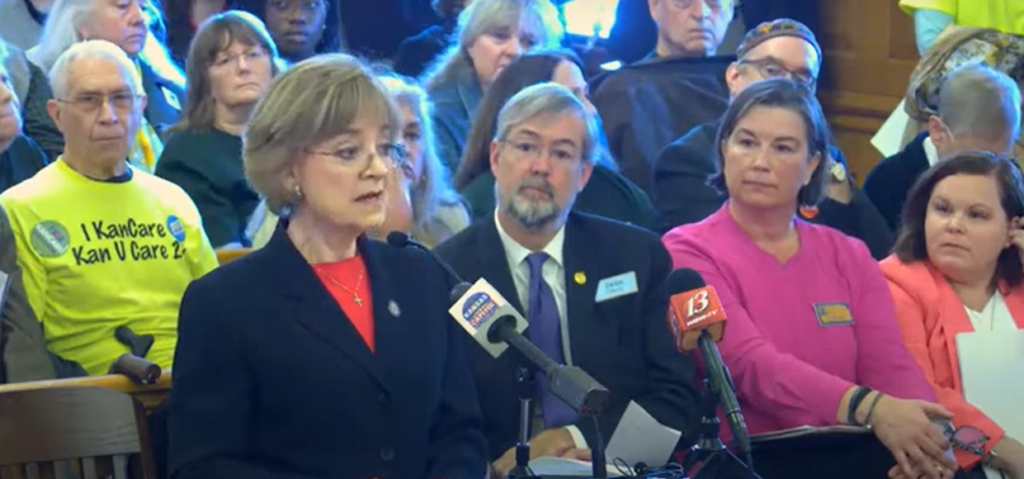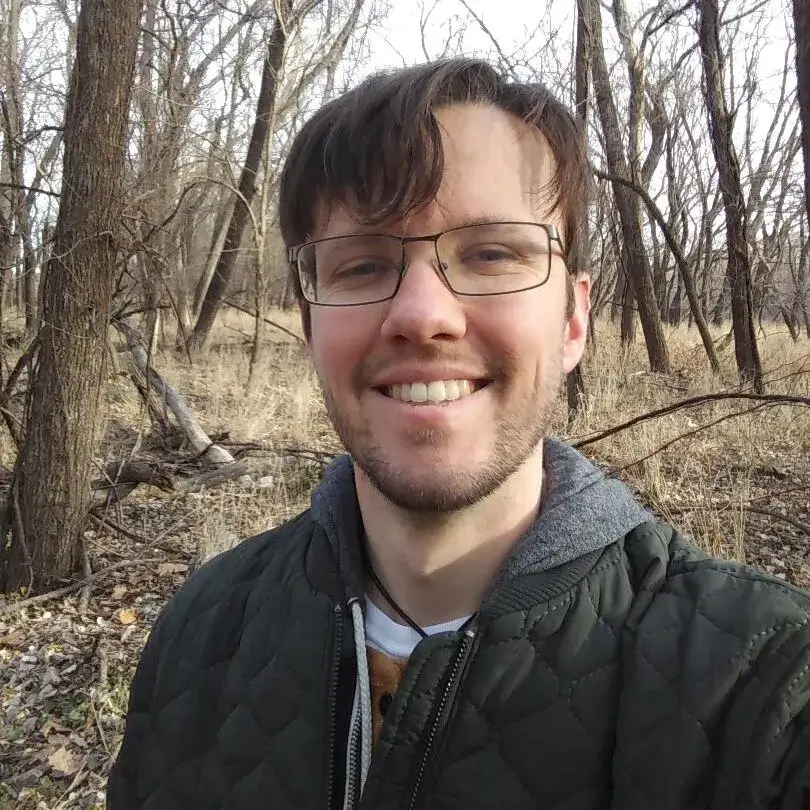Senate committees hear debate on Medicaid Expansion

For the first time in four years, the Kansas Legislature heard a public debate on Medicaid expansion. In the Senate, there was an informational hearing on Medicaid Expansion, which was heard on Wednesday, March 20.
According to a press release for Gov. Laura Kelly’s bipartisan Medicaid expansion proposal, the Cutting Healthcare Costs for All Kansans Act, there was over 900 written testimonies in support of growing the government for the purpose of healthcare—450 were submitted to the House which was hearing HB 2556, and 463 went to the Senate.
“Kansans across the state have overwhelmingly echoed the same message—they want Medicaid expansion,” Governor Laura Kelly said. “While the legislature has held hearings, it cannot stop there. The Cutting Healthcare Costs for All Kansans Act must swiftly be debated on the floor and put up to a vote.”
The Democratic Governor’s press release also claimed that “The Cutting Healthcare Costs for All Kansans Act would increase access to health care for 150,000 Kansans while injecting $1.2 billion in annual federal funding into Kansas’ economy and creating 23,000 new jobs.”
Americans for Prosperity (AFP), a Libertarian organization that has been pushing back against the big government narrative, also showed up with many people wearing green AFP shirts in support of looking at other options that would not grow the government. They have also provided information online debunking myths about Medicaid.
The Senate informational hearing was composed of the Senate Public Health and Welfare Committee and the Senate Ways and Means Committee.
State Medicaid Director Christine Osterlund spoke first as a proponent for the government expansion, speaking on behalf of Kansas Department of Health and Environment (KDHE) and the Kansas Division of Budget.
“Currently, in the Medicaid program in Kansas, not only do you have to be extremely low income to qualify for Medicaid, as an adult you must also fit into one of four categories,” Osterlund said. “You must be low income and disabled, according to the Social Security Administration. You must be low income and elderly. Low income and pregnant. Or low income and a parent or legal guardian of a minor child.”
“When we talk about low income, it’s easy just to use that term, but what does it mean,” Osterlund continued. “In Kansas today, for an adult to be eligible for Medicaid, they must be at 38 percent of the federal poverty level or below. What does that mean? A single parent with one child—the Medicaid threshold today is $648 a month is the maximum they can earn or $7,776. If they make above that threshold, they do not qualify for Medicaid.”
Osterlund further stated that Medicaid expansion would increase the limit from 38 percent of the federal poverty level to 138 percent—$2,351 a month ($28,212 a year) for a parent with one child. It would further remove the categorical requirements that she had listed.
Edward Hermann, President and CEO of HaysMed, spoke in favor of the expansion by highlighting the rural impact.
“We know that, currently for us, the impact annually on uncompensated care is over $14 million between that and charity care,” Hermann said. “We know this is not only a burden on us, we know it’s a burden on a sector of patients who would otherwise have access and Medicaid expansion to not have that financial burden put on them for the long run as well as the facility.”
“With Medicaid expansion, we would see about a $1.3 million of uncompensated care go away for us as a facility, as well as we have FQHC that’s in town in Hays which would be another additional $900,000 of uncompensated care impact for the FQHC on the funding on that point,” Hermann had further stated.
Opponents were also given an opportunity to speak against the government expansion including the Chair for the Senate Committee on Public Health and Welfare Sen. Beverly Gossage (R-Johnson County).
“As a citizen legislator, most of us have real jobs,” Sen. Gossage said. “My real job for the last 20 years has been helping Kansans and people in about half the other states find affordable health coverage, including Medicare and helping them get signed up for Medicaid. So, I will focus on my area of expertise and what I have seen in not only states that have expanded Medicaid, but have not. So, we’ll talk about the non-group market.”
“We’ve heard others talk about 150,000,” Sen. Gossage continued. “We’ve heard 70,000. Who are these folks? We know that of that 150,000, 45,000 are children and children are not included in the expansion population. We’ve also seen through KHI reports that about 68,000 of them are currently insured—either through an employer, a private plan, a short-term medical plan. So, who’s left? It leaves about 38,000 Kansans. I’m going to talk about those that are currently insured and those who could be insured through the private marketplace—federally facilitated marketplace.”
“When this was passed about ten years ago, it really hurt those in the middle income bracket, but it was a boon for those who are low income,” Sen. Gossage further stated. “100 to 138 percent of the poverty level—we’ve heard those numbers—but let me just explain that is $15,060 in the 100 percent of the poverty level. 138 percent for individuals is $20,783. In my research, I’ve discovered that over 85 percent in the states that have expanded Medicaid—those populations are single adults…. According to CMS, 171,000 Kansans chose a plan in the FFM or the Federal Marketplace. And Kaiser Family Foundation stated, ‘Zero premium plans with enhanced subsidies are available for many low income people, particularly in states that did not expand Medicaid.’ I see this every day.”
Sen. Gossage went on to explain what this meant stating that over 50 percent receive premium subsidies plus the cost sharing subsidies. She gave the example of a 27-year-old man who has aged off of his parent’s work plan. He’s earning the federal poverty level, giving him a monthly tax credit on healthcare.gov of $390 a month. He would get a zero premium plan, no deductible, a doctor’s visit would be $5, a specialist would be $10, urgent care would be $30, emergency room would be covered at 20 percent, outpatient for mental health would be $5, and generic drugs would be at no cost. The total out of pocket for the year could not exceed $1,550 to which these copays apply. She stated the individual would have lots of plans to pick from but could choose a $7.68 plan.
“Notice, it’s the zero deductible, the $1,550 total out of pocket, but it does drop the primary care to zero, specialists to $5, urgent care to $15, caps emergency room to a total of $500 which could be paid over a period of time, no charge for mental health and no charge for generic drugs,” Sen. Gossage said.
Visiting Fellow with Opportunity Solutions Project Sam Adolphsen, who was also the former Chief Operating Officer at the Maine Department of Health and Human Services where he helped oversee the state’s Medicaid program, spoke next in opposition, giving ten quick facts he felt were important to understand about Medicaid expansion.
These ten facts include:
Medicaid would only benefit able-bodied adults, many of which have no children in their household;
Enrollment in spending will blow past projections as it has done in every state that has expanded Medicaid, projecting the actual number of people added would actually be closer to 350,000 based on data from other states which would nearly double the size of the program;
Medicaid expansion has a negative impact on the workforce, as Kansas has seen a 3 percent dip in labor force over the past couple of decades while most expansion states have seen a drop of 10 percent or more in labor force participation;
People would be required by law to give up their private medical plans and be forced to receive Medicaid if expansion occurs;
Medicaid in Kansas has already expanded from 7 percent of the state budget to 23 percent of the state budget;
The Kansas Medicaid program has an error rate of about 28 percent;
Expansion in other states has not helped rural hospitals and hospitals are closing faster in some expansion states and Kansas has a $75 million Medicaid shortfall already for hospitals;
Medicaid expansion in other states is not making people healthier with 14 out of 15 of the highest drug overdose states being expansion states;
There is no deal for Kansas coming from Washington D.C. when it comes to Medicaid expansion; and
The Kansas Legislature does have an impact on the federal deficit as there is no money set aside for Medicaid and any expansion would be deficit spending on top of the $34 trillion deficit and any money not spent on Medicaid goes to reduce the deficit and not to another state like Gov. Kelly has claimed.
Thanks for reading. Be sure to share and subscribe. You can also help support independent journalism in Kansas by buying me a coffee at buymeacoffee.com/kscon.

Ian Brannan
Ian Brannan is an independent journalist who founded The Kansas Constitutional in April 2022. His work focuses on issues including abortion, Convention of States, drug policy, education, gun policy, LGBT issues, media, and more.
